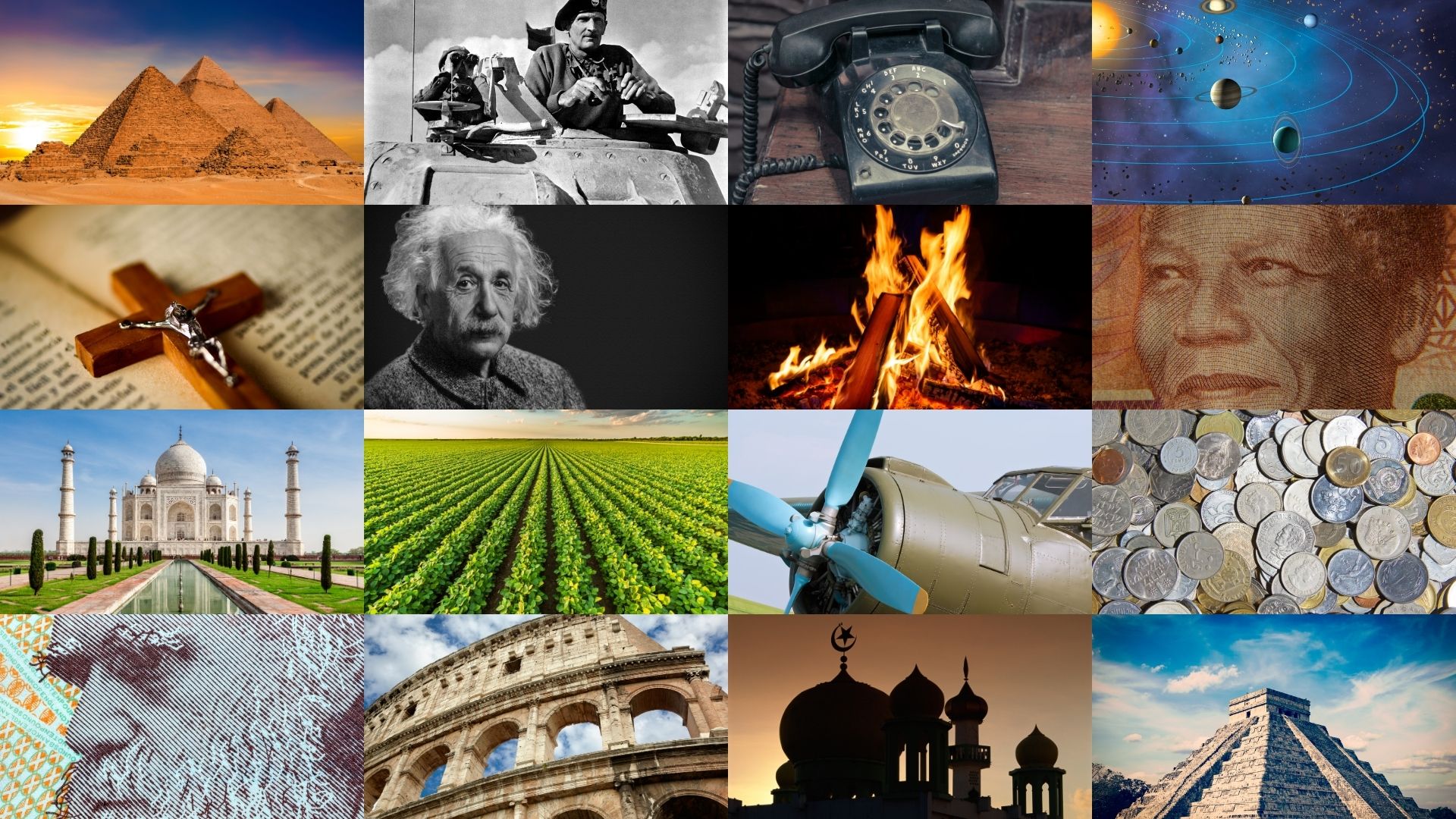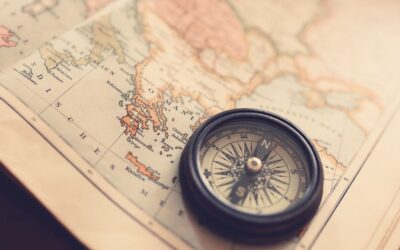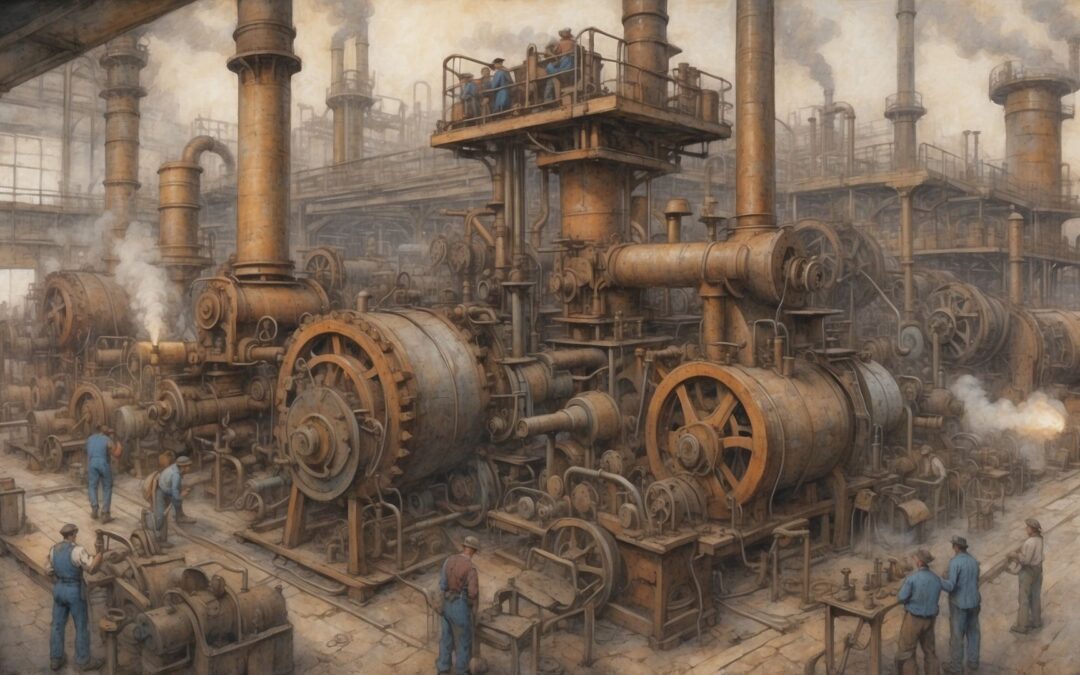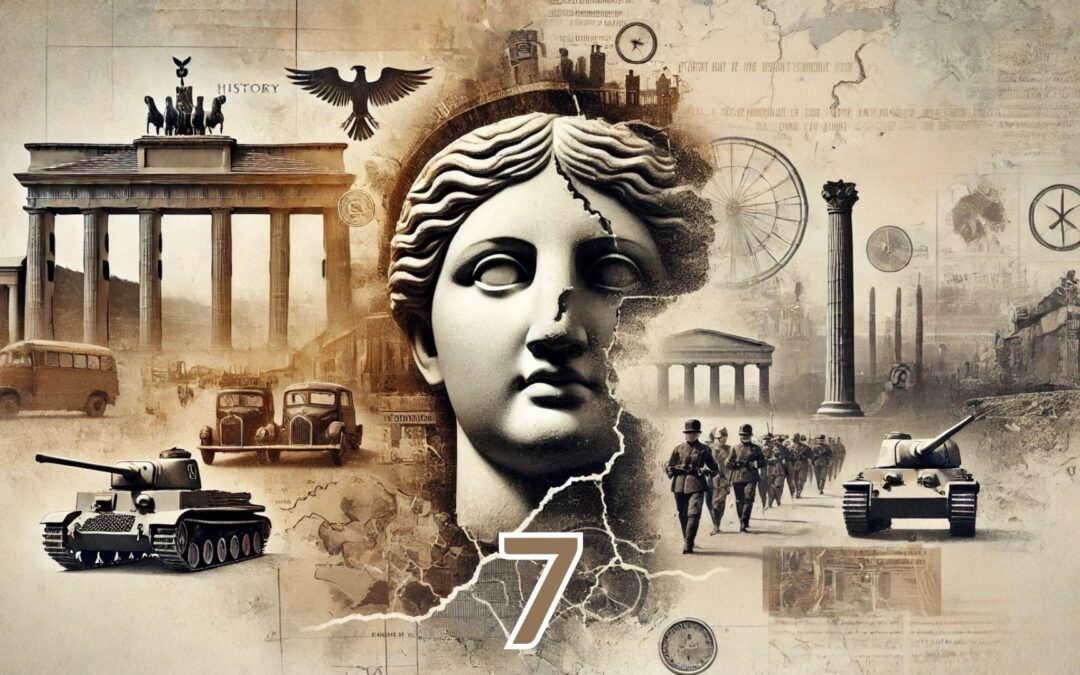Transcript
Disclaimer
I am using an automatic transcript service as it is not possible for me to do it on my own and I cannot afford human transcription at the moment. The service claims to have about 95% accuracy, which means there will still be some mistakes, so my apologies for having a less than perfect transcript, but I hope I can afford human transcription soon and I will solve this problem. However, the service is pretty good, and the transcript is almost perfect.
Transcript
Welcome to our third episode from 100 events that changed the world today, we will talk about 10 more events. We will talk about event 21 to 30. We will start talking about the modern medicine and the Hippocratic oath. We will talk about St. Augustine proposes, just war theory. We will talk about mathematicians.
[00:00:27] Think up zero. The device of the musical scales, the establishment of Islam. We will talk about Charlemagne father of Europe, and we will talk about harnessing the horse that started feudalism. We will talk about the fall of the Maya empire. We will talk about the search for America. And finally, we will talk about an amazing literary here.
[00:00:50] So without further ado, let’s start talking about the 21st event that changed the history of the world. And that is the Dawn of modern medicine with the Hippocratic oath that happened around one 68, a D the Greek physician Galen was called to roam around one 68 and to be the personal doctor to empower Marcus or alias.
[00:01:15] During his career gallon attended to five Roman emperors, but he is, I remember most for his medical revolutions after working as a physician at a gladiator school where he learned about trauma and open wounds gallon demonstrated for the first time that arteries carry blood, not air. He also discovered the distinction between Venus, dark and arterial bright blood.
[00:01:42] Along with being the first to identify seven of the 12 cranial nerves. He pioneered procedures for brain and cataract surgery gallon expanded on the belief of the four humors proposed by the Greek physician Hippocrates in the fifth century, BC blood flagging, chloric, yellow bile, and blankly black bile make up the human constitution and illness occurs when they are imbalanced.
[00:02:09] Although humor realism was the credited in the 19th century gallons, extensive writings made it the dominant thinking for two millennia, Galen also supported Hippocrates view that reason and clinical observation, not superstition should be used to treat disease. Hippocrates called the father of modern medicine remains a central figure in medicine because of the Hippocratic oath, which spells out the ethical and humane code of behavior by which physicians must abide.
[00:02:41] Today’s medical advances would not be possible without the founders of medicine, gallon and Hippocrates. And now let’s talk about the 22nd event that changed the history of the world. And that’s when St. Augustine proposes just war theory that happened in four 26, a D. Is violence ever an acceptable means to an end.
[00:03:04] This question has troubled mankind for millennia as early as the first century, BC roams Marcus Tulia, Cicero theorized on the justified use of armed force. A concept still debated by scholars and political leaders today. Modern just war theory coalesced in the fifth century with the teachings of St.
[00:03:26] Augustine of hippo, a founder of Western theology in the city of God published in four 26, a D he explored the inherent conflict between Christianity and violence. Augustine concluded that although Wars of aggression were never acceptable, sometimes war was an necessity for self-defense or protection of the innocent.
[00:03:48] He posited that in order to be considered just warring parties must not target neutral parties. So-called non-combatant immunity, which was invoked by Switzerland in world war II, 900 years later, Italian philosopher, Thomas Aquinas built on this theory describing standards that are still used to define adjust war the war must be openly declared by an appropriate authority, such as a recognized state.
[00:04:15] It must have a just cause. And the ultimate goal must be to establish, adjust peace. Despite the intent to avoid unnecessary violence. Just war has been invoked as a battle cry for conflicts from the crusades to the United States, 2003 Iraq invasion. And now for the 23rd event that changed the history of the world.
[00:04:38] And that is when mathematicians think up zero. That happened in five 20, 84 millennia numerical system started the number one, although Babylonians and Greeks used a symbol to indicate an empty spot in a number such as nine Oh seven. The concept of nothingness remained just that. Nothing. It was about 500 when India’s great mathematician, astronomers, Aria, Bata, and Vara.
[00:05:06] Mehera described zero as a quantity, which led to the transformation of mathematics from being, not just accounting system, but also a conceptual framework. During the next few centuries, Indian mathematicians worked out the laws for adding, subtracting and multiplying by nothing, but it wasn’t until the ninth century that the concept of zero finally came to the West through the written works of Persian mathematician.
[00:05:35] Alpha is me. He brought the Indian numeral system to Baghdad, where he worked at the house of wisdom, a major intellectual center during the Islamic golden age Alcoa is Ms. Also known for developing algebra and now for the 24th event that changed the history of the world. And that is when both devices, musical scales that happened around five 21 a D.
[00:06:00] Written in the sixth century, the treaties, the Institute yarn and music are by Roman philosopher and scholar both years explained ancient Greek music, which was primarily built on single melodies in the treaties. He assigned letters to pitch levels leading to the modern a to G scale. And discussed consonance scales and the intervals between pitches both.
[00:06:25] He has also adhere to the classical idea that music was intertwined with all disciplines. His work was particularly influential to scholars of the medieval period from 500 to 1500 who considered both ESD authority on music theory. His 3d has led the way for the emergence of printed music in Europe in 1465, a century later in 1558, Italian Renaissance composer and music theorist GSF was Carlino define the modern major and minor scales that are still used today.
[00:07:00] His writings spread through Europe at the end of the 16th century and influence the next generation of musicians who began composing in the early Baroque style. And now for the 25th event that changed the history of the world. And that is when a lost prophet Muhammad establishes Islam that happened in six 22.
[00:07:20] And the prophet Muhammad was born around five 70 a D in the Arabian peninsula, a place of nomadic, peoples and caravan trading centers. At the time, people worshiped nature, spirits and honored God’s house at a shrine in Mecca. The orphan Muhammad lived with his grandfather and an uncle and work as a shepherd camel driver and merchant.
[00:07:45] He earned the name of Al Amin, which means the trustworthy. When he was 25, he married a wealthy widow, 15 years, his senior with whom he had six children after her death. He is said to have married more women. By the early seventh century, the idea of monotheism had spread throughout the middle East via Judaism and Christianity.
[00:08:08] Mohammed recognize the value of one coherent doctrine of life and worship. According to Islamic teaching in the year six, 10, he had a vision and heard a voice that demanded his obedience to the one God, a law. Well, how am I began teaching? There is no God, but a law and Muhammad is his prophet. He preached that the faithful would enjoy a glorious afterlife.
[00:08:31] The wealthy, his goal in life was to share with the poor and the worship of idols was wrong. In six 22, having been warned that the leaders of various tribes were plotting to kill him. Hammad fled, Mecca, his journey, crystallized his beliefs and Mark the start of Islam, which means submission to the will of a law as well as the first year of the Islamic calendar.
[00:08:56] He gathered followers as he fled to the town of , which became Medina and Nebby. The city of the prophet now known as Medina in Saudi Arabia within a decade of arriving Muhammad’s power was recognized and he formed the first Islamic state in six 30 Muhammad returned to Mecca with a force of 10,000 men and defeated his opponents.
[00:09:20] The Koran, the Holy book of Islam is held to be the word of God as revealed to Muhammad during two decades, it was passed on to his followers who recorded it during the reign of Calif Osman. It spells out the five pillars of Islam. Belief in one God prayer, arms giving fasting during the month of Ramadan and performing the hash, the pilgrimage to Mecca, at least once in a lifetime Hamad made the first half shortly before his death in six 30, two.
[00:09:50] His successors urge the faithful, not to despair and believers spread the faith by word and by sword expansion of Islamic rule by war was seen as a sacred duty known as jihad Muhammad’s first, two successors or caliphs use jihad to establish a religious government that ruled over an empire stretching to the borders of Egypt and Persia.
[00:10:13] The third caliph after Muhammad did not have unified support among the believers arguments, raged about whether the caliphate should pass down Mohammed’s bloodline or be chosen for his leadership abilities. Mohammed’s favorite wife, Isha led the ladder. She opposed the selection of her son-in-law Ali as the new Calif gathering forces.
[00:10:35] She and her follower met alleys along the Euphrates river, near Syria and Iraq. Although both sides agreed to a peaceful settlement. The battle of the camel led to a fundamental schism in Islam. I, as followers became known as Sunni Muslims and the alleys party became the shots. The divide between the two groups still exists today.
[00:10:56] And now let’s talk about the 26 events that changed the history of the world. And that is Charlemagne father of Europe. That happened around 800. Ady often called the father of Europe, Charlemagne King of the Franks, brought to his lands, a unity unknown. Since the Roman empire, the Franks had steadily gained power since the collapse of Rome in four 76.
[00:11:20] When Charlemagne assumed the throne in seven 68 at the age of 26, after the death of his father King Pepin, the short he inherited close ties to the Catholic church and energetic warrior and statesman Charlemagne conquered, Germany, France, Northern Spain, and most of Italy then forced the defeated to accept Christianity.
[00:11:42] During his reign, the ancient term Europe was revived to describe the realm, but the Frank has stayed. He founded is known as the Carolingian empire. A firm believer in education Charlemagne is said to have ushered in the Carolingian Renaissance. He supported the arts funded great libraries in the monasteries and increased the number of scriptorium where books were copied and translated.
[00:12:06] Carolingian schools preserved. Most of the classical Latin works that survived today and develop a more legible script. An early source for modern Italax script. The most famous moment of Sharla mains rain occurred at mass on Christmas day in St. Peter’s Basilica Rome in 800 bull Pleo, crown Charla main proclaiming him Charles Augustus.
[00:12:30] Holy Roman emperor from then on the papacy was loyal to Europe rather than Byzantine. And now for the 27th event that changed the history of the world. And that’s harnessing horses that strengthens feudalism that happened in nine 2080. The horse scholar is thought to have originated during the sixth century in bacteria and ancient Iranian civilization located in present day Northern Afghanistan, where callers were already in use on camels.
[00:12:59] When the color made its way to Europe around nine 20, along with heavy wheel plows from Asia and agricultural revolution began. Because horses are 50% faster than oxen using them for plowing increased farmers’ yields. For the first time, there were food surpluses, which led to the success of the European feudal system originally devised to address medieval peoples dual needs for military protection and food production.
[00:13:28] Feudalism was a political class system. It appeared in Japan, China, Persia and , but its most systematic use was in Europe, starting in the eighth century, the King parceled out largest States to his Nobles and exchange for their support, the novels then guarded the King’s realm and doled out their land to lesser Lords who served as Knights in times of conflict.
[00:13:53] The peasants or serfs farm the land for their Nobel masters, who grew rich from the serfs labor as the threat of invasion diminished in the 11th century. Many surfers slipped away to grow in towns, but in Russia, the system would not be abolished until 1861 when SAR Nicholas, the second outlawed it in fear of massive surf rebellions.
[00:14:16] And now for the 28th event, that changed the history of the world. That is the fall of the Maya empire in 1987 of all the pre-Colombian civilizations in the Americas. The Maya are the most well-known because they were literate. They’re intricate hieroglyphic writing is inscribed on temples tablets and pottery scattered in the jungles of the Walkertown peninsula.
[00:14:40] As scholars deciphered, the glyphs, they learned that the Maya kept an accurate calendar where careful astronomers and brilliant mathematicians and practiced bloody rituals to appease the gods. Flourishing from two 50 to nine 87 in the era known as the classical Maya, they built huge complexes around ceremonial, temples, and pyramids temple centers, such as Cision it’s a, anti-coal supported hundreds of thousands of citizens, including slaves from neighboring tribes.
[00:15:11] But the empire built on intensive construction and agrarian labor was unsustainable because the jungle couldn’t support the 1.5 pounds of maze. Each Maya required daily in nine 87, the Toltec warrior tribe who lived to the North in today’s Mexico, over ranch. And it’s a and settled in Maya lands.
[00:15:33] Throughout the next generation, some of their people merge bloodlines and traditions, although elements of Maya civilization persevered the Toltec and then the Aztec would become the region’s dominant empires for the next 500 years today, despite this some 7 million Maya live in Mexico, Guatemala Lee’s and preserve their ancient heritage.
[00:15:56] And now for the 29th event that changed the history of the world. That’s when Erickson, Columbus Vespucci and the search of America happened that started in 1001. When North Explorer, Leif Erickson’s journey are shrouded in the midst of the past. But archeological evidence supports the theory that biking’s landed on the Western coast of Canada around 1000, although they left no permanent settlements Leafs, one giant step for Viking kind was the first imprint of change on native North America.
[00:16:30] Nearly 500 years later, queen Isabella of Castiel champion, the quest of Christopher Columbus to chart a westward sea route to India promising the queen riches and a trade monopoly. He set sail after a two month journey. He struck land at a place. He named San Salvador in The Bahamas, despite not having first discovered America and wrongly insisting.
[00:16:53] He was in Asia Columbus found the best routes between Europe and the new world. On a journey for the Portuguese King in 1499, seven years after Columbus reached San Salvador, the Italian America Vespucci became the first European to reach South America through astronomical and geographical observations.
[00:17:14] Vespucci suspected. He had found a new continent of fact Columbus died denying. When a German clergyman read a publication detailing Vespucci, his evidence, he included a proposal to name the new lens America. After Vespucci in a world Atlas, he published in 1507 soon. All of Europe was calling the new world America.
[00:17:37] And now for the final event for today’s episode, the 30th event that changed the history of the world. An amazing literary here that’s 1010, the crown jewel of Japanese literature, Muraki Shikibu is the tale of Genji written in 1010 is the world’s first novel. The novel is also the world’s first juicy tele Murasaki was a lady in waiting and companion to the impress at the Japanese court.
[00:18:04] The gorgeous prose masterfully follows the court and the romances of her hero, Jenji, who is thought to be modeled after he and emperor Fujiwara Naga, some compare Murasaki’s expression of the hae in court to that of Shakespeare’s education of Elizabethan, England. Thousands of miles from Japan. Another national masterpiece was completed in the year 10,010.
[00:18:29] Instead of focusing on just one King purchase. China may aim to Chronicle all the Kings of the land from mythical times through the seventh century, almost 60,000 couplets exalting Persia’s history of Kings were written by the poet. Ferdowsi from the stories found in older texts. Many consider fair doses, Epic.
[00:18:50] The most important work of Persian literature ever written like Homer’s Iliad and Odyssey, the masterpieces of Murasaki and Ferdowsi reveal, ancient life and culture to modern readers. Perhaps even more importantly, the portraits of Eastern culture provided in these novels allow a glimpse into a world where until then only a few Westerners had been or seen.
[00:19:15] Now with this event, these will be 30 events that changed the history of the world. Now we have completed three episodes from our series 100 events that changed the world. Don’t stop now, stick around because we still have 70 more events that we will talk about to complete the series of 100 events that changed the history of the world.
[00:19:37] Don’t forget that you can find the transcript of this episode in our website. You can find the link in the description, go to our website, English plus podcast.com. You will find the transcript and you will find a lot of other useful exercises, PDF, downloadable worksheets, interactive exercises for some episodes, all on our website, English plus podcast.com.
[00:19:57] With that being said, this is your host, Danny. I would like to thank you very much for listening to another episode from English plus 100 events that changed the history of the world. I will see you in the next episode.











0 Comments